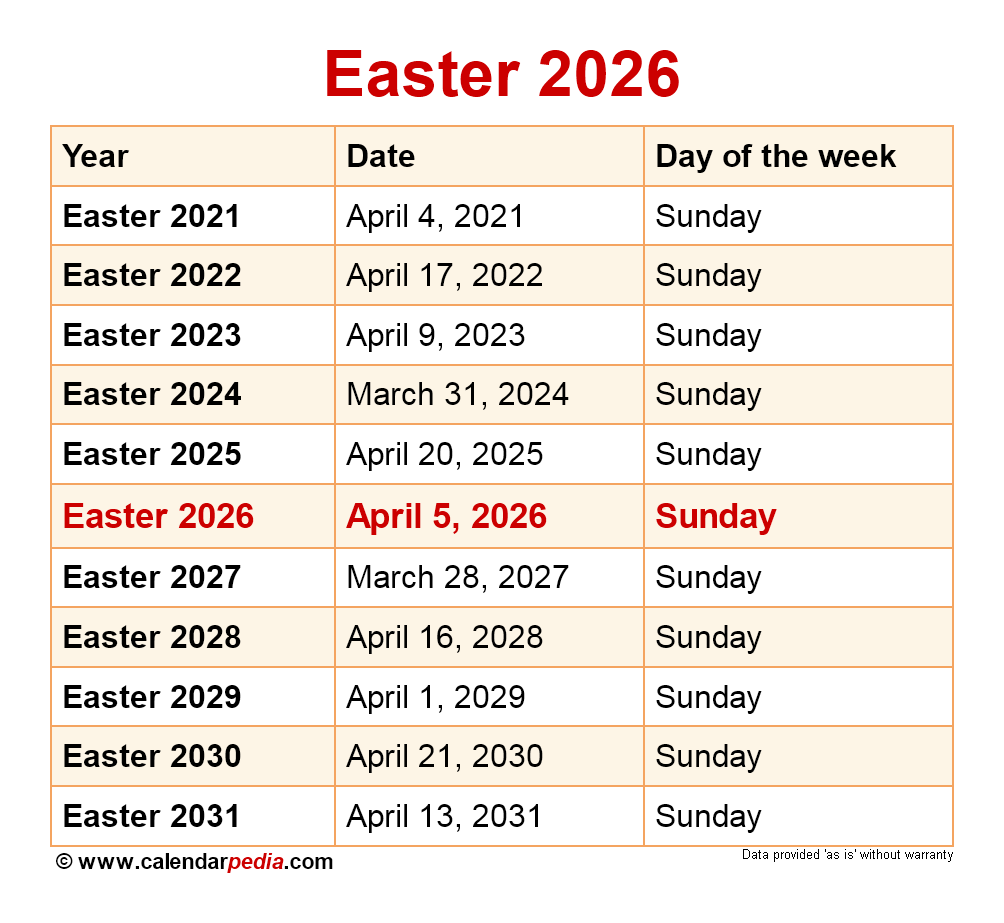When Is Easter: Understanding The Date And Its Significance
When is Easter? This question arises every year as millions of Christians around the world prepare to celebrate one of the most important events in the Christian calendar. Easter, which commemorates the resurrection of Jesus Christ, does not have a fixed date and varies each year. This article aims to provide a comprehensive understanding of Easter's date, its historical significance, and how it is celebrated globally.
In this article, we will delve into the intricacies of the Easter date calculation, explore its historical roots, and discuss various traditions associated with the celebration. By the end of this article, you will not only know when Easter falls each year but also appreciate the rich cultural tapestry that surrounds this holy day.
Whether you are curious about the date of Easter for planning festive gatherings or want to learn about its significance in Christianity, this guide offers a thorough insight. Let’s embark on this journey to uncover the mysteries of Easter!
Table of Contents
- What is Easter?
- History of Easter
- How is Easter Date Calculated?
- Easter Traditions Around the World
- Easter Symbols and Their Meanings
- Easter in Different Christian Denominations
- What to Prepare for Easter?
- Future Easter Dates
What is Easter?
Easter is a Christian festival that celebrates the resurrection of Jesus Christ from the dead. It is regarded as the culmination of the Passion of Jesus, which begins with Lent, a 40-day period of fasting, prayer, and penance.
The significance of Easter lies in its representation of hope, renewal, and resurrection. It serves as a reminder of the Christian belief in eternal life and the victory of Jesus over sin and death.
History of Easter
The celebration of Easter has its roots in the Jewish Passover, which commemorates the liberation of the Israelites from Egyptian slavery. Early Christians adopted the timing of Passover to celebrate the resurrection of Jesus, which they believed occurred shortly after Passover.
Historically, the first recorded observance of Easter dates back to the 2nd century AD. Over the centuries, various customs and traditions have evolved, influenced by cultural and regional practices.
How is Easter Date Calculated?
The date of Easter is determined using a lunisolar calendar, which calculates the first Sunday after the full moon following the vernal equinox (approximately March 21). This means that Easter can fall anywhere between March 22 and April 25.
Key Points of Calculation
- The Council of Nicaea in 325 AD established the formula for determining Easter's date.
- The vernal equinox marks the beginning of spring in the Northern Hemisphere.
- The full moon is used to approximate the timing of Passover, aligning the two celebrations.
Easter Traditions Around the World
Easter is celebrated in diverse ways across the globe, with each culture adding unique customs and traditions. Here are some notable traditions:
1. United States
In the United States, Easter egg hunts and the Easter Bunny are popular traditions. Children search for hidden eggs, often filled with candy or toys.
2. Spain
Spain is known for its elaborate Semana Santa (Holy Week) processions, where religious statues are paraded through the streets.
3. Australia
In Australia, the Easter Bilby, a native marsupial, has become a symbol of Easter, replacing the Easter Bunny to promote awareness of endangered species.
Easter Symbols and Their Meanings
Several symbols are associated with Easter, each carrying deep significance:
- Eggs: Symbolize new life and resurrection.
- Cross: Represents the crucifixion of Jesus and the salvation of humanity.
- Lilies: Signify purity and the resurrection of Christ.
Easter in Different Christian Denominations
Different Christian denominations may celebrate Easter on different dates and with varying traditions:
Catholic Church
The Catholic Church follows the Gregorian calendar for determining Easter, leading to celebrations on a different date than some Orthodox Christians.
Eastern Orthodox Church
The Eastern Orthodox Church typically observes Easter on a later date due to the usage of the Julian calendar for calculating the date.
What to Prepare for Easter?
Preparing for Easter can involve various activities, including:
- Decorating Easter eggs
- Planning family meals and gatherings
- Participating in church services
- Organizing community events and charity work
Future Easter Dates
Here are the upcoming dates for Easter Sunday:
- 2024: March 31
- 2025: April 20
- 2026: April 5
Conclusion
In summary, Easter is a significant celebration that embodies the core beliefs of Christianity. Understanding when Easter is celebrated and its importance provides deeper insights into the faith and its traditions. We encourage you to share your thoughts in the comments, and feel free to explore more articles on our site about related topics.
Penutup
Thank you for taking the time to read this comprehensive guide on Easter. We hope you found it informative and engaging. Please visit us again for more enlightening articles on various topics!
Understanding Blasian Males: Culture, Identity, And Representation
Exploring The Thrills And Chills Of Play Paranoia: A Comprehensive Guide
Rahmat Morton: A Journey Through His Life And Achievements


